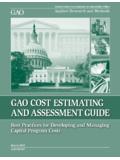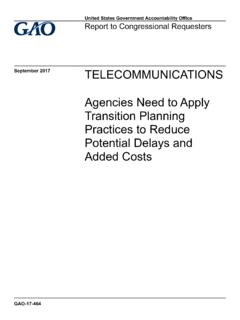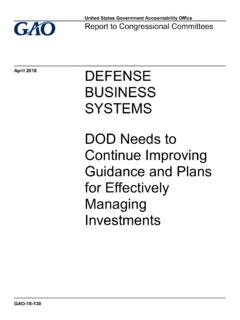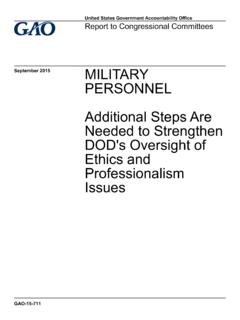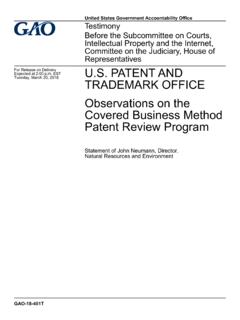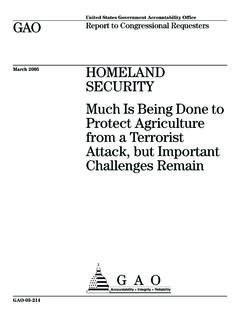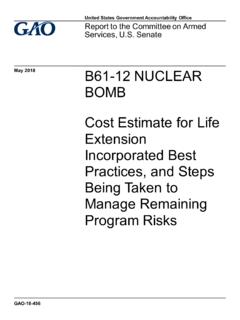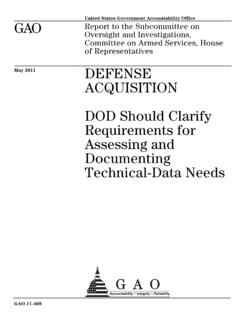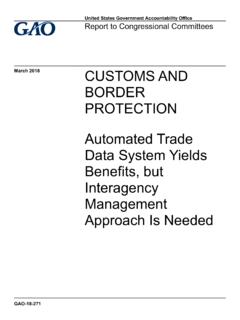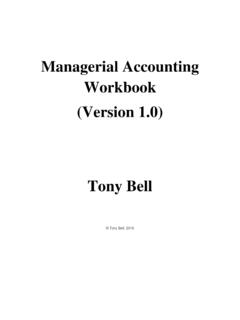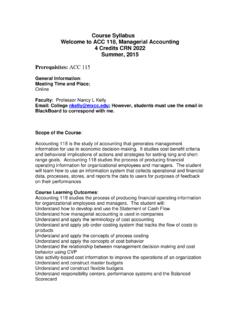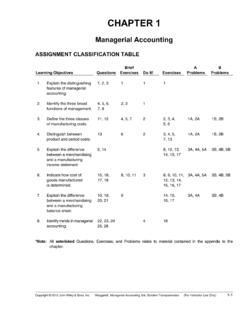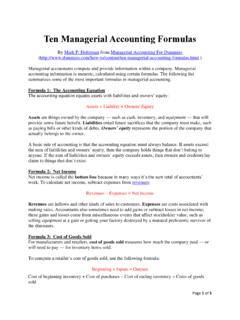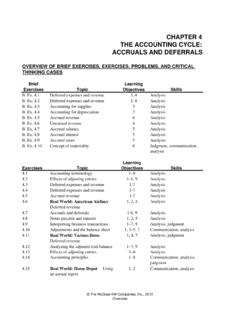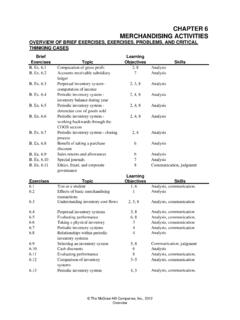Transcription of Managerial Cost Accounting System Requirements
1 Managerial cost Accounting System Requirements Federal financial Management Svstem Reauirements FFMSR-8 February 1998 What is JFMIP? T he Joint financial Management Improvement Program (JFMIP) is a joint and cooperative undertaking of the Department of the Treasury, the General Accounting Office, the Office of Management and Budget, and the Office of Personnel Management, working in cooperation with each other and other agencies to improve financial management practices in government. The Program was given statutory authorization in the Budget and Accounting Procedures Act of 1950 (3 1 USC 65). Leadership and program guidance are provided by the four Principals of the JFMIP--Comptroller General of the United States, Secretary of the Treasury, and the Directors of the Office of Management and Budget, and the Office of Personnel Management. Each Principal designates a representative to serve on the JFMIP Steering Committee, which is responsible for the general direction of the Program.
2 The JFMIP Executive Director, and a program agency representative (who serves for 2 years) are also on the Steering Committee. The Program promotes strategies and guides financial management improvement across government; reviews and coordinates central agencies activities and policy promulgations; and, acts as catalyst and clearinghouse for sharing and disseminating information about good financial management practices. This information sharing is done through conferences and other educational events, newsletters, meetings with interagency groups and agency personnel, and through FinanceNet, an electronic clearinghouse on the Internet. The JFMIP has worked on interagency projects that developed a financial systems framework and financial systems Requirements . For the lirture JFMIP plans to assist Federal agencies in improving their financial systems through its Program Management Office. The Office will work on revising the Federal government s Requirements definition, testing and acquisition processes, the first target of opportunity is core financial systems.
3 The objectives of the Office are to develop systems Requirements , communicate and explain Federal and agency needs, provide agencies and vendors information to improve financial systems, ensure that products meet relevant System Requirements , and simplify the procurement process. Information on JFMIP can be found at its website at or call (202) 5 12-920 1. In&oduction _____-_____----------------------------- ---------*-------------- i I. Overview of System Requirements for Managerial cost Accounting --------------- I- 1 Summary of Information Requirement.+ _____---- - _____ I-2 S-mary of Fm&onal Requiremen&-- _____----------- 1-3 S-mary of Intqp~on Requiremen@ _____------------ 1-3 II. Information Requirements _____-------__-------------------------- ------------------------- II-1 financial Information Classification Structure _____ r ____ II-2 Operations Information Classification Structure _____ II-4 program I&m-&on Classification Smcme _____-- II-5 III. Functional Requirements _____-_____-___------------------------- --------------------- III-1 System Administration _____------------------------------- III-1 Data Capme _____----------------------------------- -------- III-3 cost &signment _____----------------------------------- ---- III-5 cost Classificatjon _____ -- _____-------- III-7 cost Monitoring _____r_____----------------------------- ---------- III-9 Appendix A.
4 Laws and Policies Affecting Managerial cost Accounting Systems -- A-l Appendix B. Contributors _____s _____ B- 1 ,--, T he JFMIP System Requirements fir Managerial cost Accounting document is one of a seriesof JFMIP publications on federal financial ~ I management System Requirements . All of these documents should be considered together when best to use information technology and supporting services to meet a ,federal agency s financial management needs. The Framework for Federal financial Management Systems describes the basic-elements of a model for integrated financial management systems, the relationships between the model elements, and specific considerations in developing and implementing integrated financial management systems. Each of the other documents in the series, beginning with Core financial System Requirements , describes the functional Requirements for a particular type of System . This particular document is called System Requirements for Managerial cost Accounting , rather than Managerial cost A&bunting System Requirements , because cost Accounting functions may be supported by many types of systems, such as the core financial System , inventory and fixed asset systems, programmatic systems, and others, in addition to systems dedicated to cost Accounting .
5 This System Requirements for Managerial cost Accounting document is intended for systems analysts, systems accountants, and systems developers as well as program managers and other users who are ,defining Requirements that software supporting Managerial cost Accounting functions in their organizations must meet; This document builds upon, and provides a means to implement, Requirements related to cost Accounting set forth in the Chief financial (CFO Act), Government Performance and Results Act (GPRA), Statements of Federal financial Accounting Standards (SFFAS), Office of Management and Budget (OMB) circulars, and other sources. It accomplishes this by specifying information and functional processing Requirements for accumulating and analyzing cost data consistent with governmentwide guidance. Laws and policies affecting systems for Managerial cost Accounting are identified in Appendix A. Glossaries of terms relating to Managerial cost Accounting may be found in SFFAS Number 4, Managerial cost Accounting Concepts and Standards for the Federal Government, and the Managerial cost Accounting Implementation Guide prepared by the Governmentwide cost Accounting Committee of the Chief financial Officers Council.
6 As shown in Illustration 1, standards and System Requirements assist agencies in selecting effective and efficient systems: The Requirements in this document are intended to facilitate the acquisition, development, and enhancement of systems that provide information useful in managing and controlling the cost of government. The document establishes the standard, governmentwide System Requirements that an agency should consider for systems supporting Managerial cost Accounting functions, but also allows flexibility to address agency-specific Requirements , such as those associated with the choice of costing methodology ( , activity-based costing). i JFMIP does not expect the . Requirements provided herein to be sufficient by ! themselves to enable an agency to make an informed decision regarding a 1 System s ability to meet the agency s,needs for Managerial cost Accounting , but g ; rather to .provide a starting point for such an: analysis by identifying applicable governmentwide policies and standards.
7 Each agency should integrate its p i unique information, functional, and technical Requirements with the I Requirements provided in this document to determine the complete set of I System Requirements for Managerial cost Accounting in its particular / environment. , / ., illustration i I , . 5 / i , financial System Improvement Projects Standards/ lequirements . Standard Reporting Requirements . Government Standarc General Ledger l Core financial System Requirements . Travel System Requirements . Seized/Forfeited Asset System Requirements . Direct Loan System Requirements l Guaranteed LOan System Requirements . hlveotcry System Requirements 1 . Managerial cost Accounting System I Requirements ------- 1 . Other Standards ,Agency lmplemdniation . , . Additional Agency Fupctipnal Requirements . Additional Agency Technical Requirementi . scfhvare/ Hardware Evaluation . Adaptation . Procedures . Training . Documentatkm I - -1 Subject of L- , this report ii lntroduqtion : i: Although some agencies, particularly.
8 Those++th manufacturing or other commercial-like operations, have some experience with Managerial cost Accounting , many agencies are just now dealing with it for the first time. Agencies for whom cost Accounting is a new .discipline may have some difficulty at .first in complying with the fe,deral accgunting standards for Managerial cost Accounting . ;However, combiningcost Accounting , performance measurement, financial ~reporting;and budgetary control in an : agency s ,single, integrated fmancial ,management System can be expected to provide srgnificant by facilitating more; mformed allocations of limited federal resources and, other,management. decisions. Furthermore, agencies can develop and improve their Managerial cost Accounting capabilities over time.. , , SFFAS .Number 4, Managerial cost Accounting Concepts and Standards for the Federal Government, requires reporting entities to perform at least a certain minimum level of cost Accounting and provide a basic amount of cost Accounting information necessary to accomplish the many objectives associated with planning, decision making, and reporting.
9 This minimum level includes collecting cost information by responsibility segments, measuring the full cost of outputs, providing information for performance measurement, integrating cost Accounting and general financial Accounting with both using the Standard General Ledger, providing the appropriate precision of information (it should be useful but not unnecessarily precise or refined),, and accommodating any of management s special cost information needs that may arise due to unusual or special situations or circumstances. While each entity s Managerial cost Accounting should meet these basic Requirements , the standard does not specify the degree of complexity or sophistication of any Managerial cost Accounting process. As long as the entity complies with the Managerial cost Accounting standards, it may use a cost Accounting System or use cost finding techniques and other cost studies and analyses. Some entities may use a combination of a System supplemented by cost studies. SFFAS Number 4 defines a cost Accounting System as a continuous and systematic cost Accounting process which may be designed to accumulate and assign costs to a variety of objects routinely or as desired by the management.
10 It also states that such a System may be best for some, though not all, reporting entrties. Off-the-shelf software is commercially available that can meet many of an agency s needs related to Managerial cost Accounting . However, even if the agency is using such software, agency management still needs to make decisions regarding the cost objects to be defined, the costing methodology to be used, the types of costs to be included for each reporting or decision making purpose ( , full cost ), and other items of a similar nature,. Agencies should also carefully cons++- the need and opportunity for streamlining or reengineering their processes to take maximum advantage of a new System . For example, processes that might be examined include those that would be used to provide input more reliably and efficiently to cost Accounting calculations, those that might use information resulting from cost Accounting to make better decisions, and the cost assignment processes themselves. Use of Managerial cost Accounting has the potential for making.

